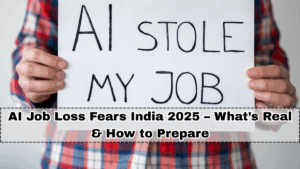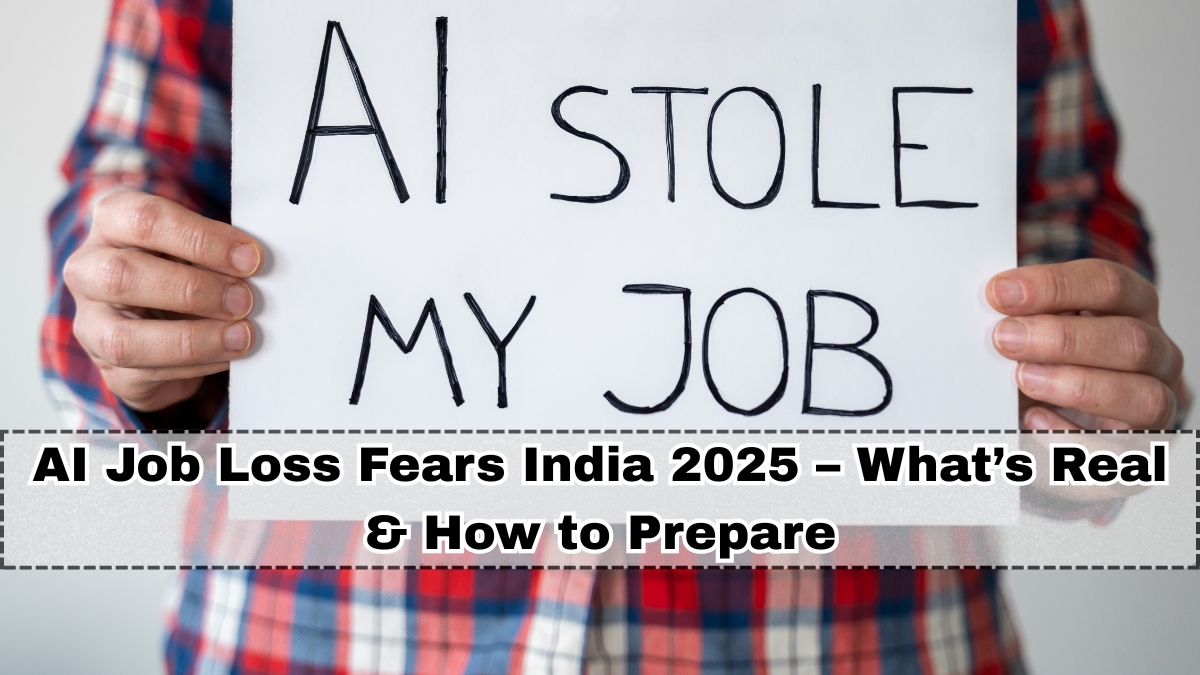The rise of AI Job Loss Fears India 2025 reflects a major workplace shift as automation and AI systems become more efficient across industries. From customer support and retail to finance and logistics, AI is taking over repetitive tasks and reshaping how companies operate. This has caused many Indians to worry about job security, career growth, and long-term stability in an automated world.
While AI is indeed changing roles, experts believe it is reshaping jobs more than replacing them entirely. The real challenge is adaptation—learning new tools, upgrading skills, and staying relevant in a rapidly evolving job market. Instead of fear, smart preparation can help workers benefit from automation India trends.

Why Workers Are Worried About AI in 2025
Companies across India are adopting AI-based automation to improve productivity, reduce costs, and increase accuracy. This shift has created anxiety among employees who fear losing jobs to machines. The biggest concerns driving AI Job Loss Fears India 2025 include:
• AI replacing routine tasks in customer service
• Automation in manufacturing, logistics, and retail
• Chatbots handling basic support and queries
• Algorithms performing data entry and analysis
• Cost-cutting leading to smaller human teams
These factors make workers question how their roles will evolve in the coming years.
Which Jobs Are Most at Risk?
Automation India is impacting different job sectors differently. Roles that involve repetitive, predictable tasks are more vulnerable, such as:
• Data entry operators
• Tele-calling and customer support agents
• Basic accounting and invoicing roles
• Retail cashiers and front-desk assistants
• Manufacturing line workers
• Simple content moderation tasks
However, AI struggles with jobs requiring creativity, empathy, decision-making, and complex human interactions.
New Job Roles Emerging Due to AI
While some roles shrink, many new roles are emerging. In 2025, companies are hiring for positions like:
• AI prompt engineers
• Automation supervisors
• Data quality and annotation specialists
• AI ethics analysts
• Workflow designers
• Digital transformation managers
• Human-AI collaboration experts
These jobs focus on guiding, improving, and managing AI systems rather than competing with them.
How Indians Can Prepare for an AI-Driven Future
The best way to overcome AI Job Loss Fears India 2025 is through upskilling. Workers who learn new digital tools and improve analytical thinking are better positioned for career growth. Key strategies include:
• Learning AI-friendly tools like Excel, automation platforms, and CRM software
• Improving soft skills—communication, creativity, leadership
• Building technical skills like data analytics or basic coding
• Taking online courses in digital marketing, UI/UX, finance tools, and business intelligence
• Staying updated with industry trends
These steps help workers transition smoothly into future-ready roles.
How Companies Are Supporting the Workforce
Many Indian companies are now offering internal training programs to prepare their employees for AI adoption. They conduct workshops, skill-based courses, and cross-department training to help staff adapt. Instead of replacing employees, companies prefer reassigning them to more strategic roles.
Additionally, organisations now value human creativity, emotional intelligence, and problem-solving—skills AI cannot replace.
The Reality: AI Is a Tool, Not a Threat
Despite fears, AI is not eliminating all jobs. It is reducing manual workload and freeing employees to focus on tasks requiring strategy and innovation. Those who adapt and learn new skills will find more opportunities in 2025 and beyond.
The future of work in India lies in collaboration between humans and AI—not competition.
FAQs
Will AI completely replace jobs in India?
Not completely. It will replace repetitive tasks but create new roles requiring human skills.
Which jobs are safest from automation?
Creative, leadership-based, analytical, and emotionally driven roles are least affected.
How can workers prepare for AI changes?
By upskilling, learning digital tools, improving soft skills, and staying updated.
Are companies reducing staff because of AI?
Some roles are shrinking, but many companies focus on reassignment and training.
Is AI good for the future workforce?
Yes, when used correctly, AI boosts productivity and opens new career opportunities.
Click here to know more,
